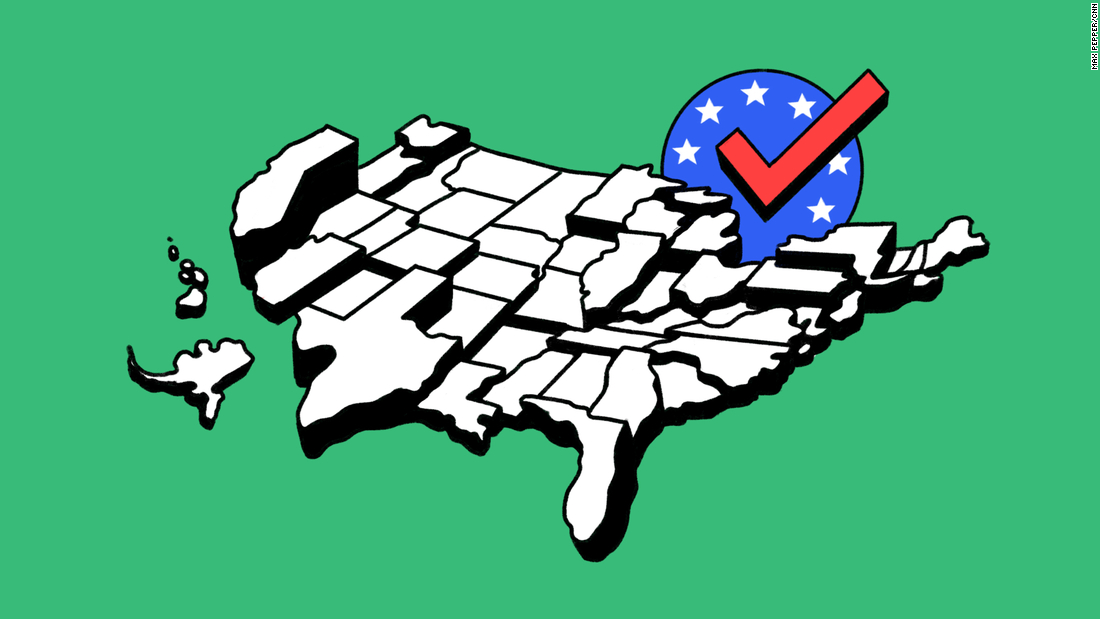Is there a legal tool to remove Trump if he does not concede?
1:09
(CNN) -
We've known for weeks that Joe Biden won the 2020 presidential election, but the American Constitution, written before instant communication, works very slowly.
Since Election Day Nov. 3, all 50 states and the District of Columbia have certified their votes and appointed lists of voters, who will meet on Monday to formally cast their votes for President and Vice President, the next step in the Biden victory completion process.
Those ballots will be sent to Washington, where they will be counted by Congress on January 6.
Once that happens, Biden will take over as 46th president on January 20 at noon.
The system has been refined in the Constitution and detailed in United States law for the past 200 years or more, but has not undergone a major overhaul since the 1870s, when the transcontinental railroad and the telegraph were at the forefront of the technology and innovation.
Here's a look at what's going to happen on Monday and why.
Much of this refers to the very detailed website maintained by the National Archives and the Federal Register, which helps states coordinate the process:
Why is this happening on Monday, December 14?
It is a matter of law that the voters meet the first Monday after the second Wednesday in December.
That allows states enough time after Election Day, which is the first Tuesday after the first Monday in November, to resolve disputes over the results.
advertising
This is a complicated way of locating the two-step process of the US presidential elections, general and electoral, in early November and December, respectively, and giving new presidents enough time to arrive in Washington for the January inauguration. .
What happens on monday
Voters meet in their states and cast votes, individually and on ballots, for president and vice president.
Where they meet is different from state to state and is often set out in state law.
In most states, it is in the state capitol building or the governor's office.
READ
: ANALYSIS |
The Electoral College is ready to seal Trump's fate, once again
Voters voted on November 3.
What's the point of this?
The Constitution is clear that the electors, not the voters, choose the president and vice president.
Monday is the day that voters officially cast their presidential votes, which are those counted by Congress and technically elect the new president.
Who are these voters?
They were chosen in spring or summer by state parties.
They are often party bigwigs, like governors or elderly statesmen.
Former President Bill Clinton and former Secretary of State Hillary Clinton are two of the voters in New York, for example.
Stacey Abrams from Georgia is another.
But about most of these people you have never heard.
How can I see the names of my constituents?
After the election and before the Electoral College meets, each state is supposed to prepare verification certificates, an official document describing the result of the election and the list of voters.
The National Archives publish them online.
Is there anything that requires voters to support the winner of your state?
Yes and no.
There is nothing in the Constitution of federal law that requires a voter to support the candidate who won their state.
But there are penalties in state law, fines, for example.
The Supreme Court recently confirmed these infidel voter laws as constitutional in July.
There were ten unfaithful voters after the 2016 elections. The National Association of Secretaries of State maintains a database of unfaithful voter laws.
What really happens when the voters meet?
It is different in every state, and these meetings are scheduled to take place between 10 am ET on the East Coast and 7 pm ET in Hawaii.
Voters record their votes in writing and then count them.
Then they sign six copies of a Voting Certificate.
The National Archives will release those Voting Certificates when they receive them, but if you want to see what they look like, here's the one for Washington State from 2016, which reflects the votes for Hillary Clinton, but also the rebel votes for Colin Powell and Faith Spotted Eagle. .
What happens if something happens to a voter?
It is sad but true that things happen.
A Massachusetts voter recently died, for example.
Your vote will be declared "vacant" and replaced from a pool of alternates.
In many states there are automatic alternate voters.
Why are there six copies of the results?
This is the 19th century version of copying different people in an email.
According to the National Archives, the six copies go, by certified mail, to:
a copy goes to the president of the United States Senate and will be officially counted in the Capitol on January 6
two copies go to the state secretary of state
two copies go to the National Archives and Records Administration
a backup copy is sent to the presiding judge in the district where the electors meet
Will I be able to see this?
CNN is working to make sure that most of this process is visible.
Tune in to CNN and CNN.com.
Has the covid affected the process this year?
Yes!
Three states, Colorado, Nevada and Utah, will hold virtual meetings by video conference.
Is this the end?
No. The mail must transport the Voting Certificates.
Congress must count them.
An inauguration must occur.
What happens next
The Postal Service has until December 23 to deliver the voting certificates to the Senate.
Congress meets to count electoral votes on January 6 (Vice President Pence will preside).
The winner (Biden) will be sworn in on January 20.
LOOK
: This will be Joe Biden's plan to combat covid-19 during his first 100 days as president
Is Trump likely to accept the result after the voters' meeting?
Right now it seems that he will never acknowledge the outcome of the elections.
You don't have to.
Is there more room for Trump and the Republicans to get in the way of the process?
Yes a little bit.
First, look for Republican legislators who object during the vote count on January 6.
If a member of the House and the Senate file an objection, the two houses of Congress meet separately to consider it.
In 2016, Democrats in the House raised objections, but did not get a second from a senator.
That seems more likely this year.
Both houses would have to accept the objection, which will not happen with the Democrats in charge of the House.
So the end result is still assured, but so is the forecast for the drama.
READ
: ANALYSIS |
The Electoral College is ready to seal Trump's fate, once again
Separately, the Supreme Court on Friday rejected Texas' attempt to override millions of votes in four states.
The offer from Texas was joined by Trump, 126 Republican members of Congress and more than a dozen Republican attorneys general.
Texas had no right to sue Georgia, Michigan, Pennsylvania, and Wisconsin for their election laws and rules.
Which means the case was over.
CNN's Dan Berman contributed to this report.
Electoral College


/cloudfront-eu-central-1.images.arcpublishing.com/prisa/UA7QFUHVWEFO4P5F7BKC6FJXOY.jpg)
/cloudfront-eu-central-1.images.arcpublishing.com/prisa/BV6O2LVCLUWSTEPDRM4F3RJ5HA.jpg)



/cloudfront-eu-central-1.images.arcpublishing.com/prisa/MAVSIP6MF252ZKL4ZEZAPMSUPQ.jpg)



/cloudfront-eu-central-1.images.arcpublishing.com/prisa/KMEYMJKESBAZBE4MRBAM4TGHIQ.jpg)



